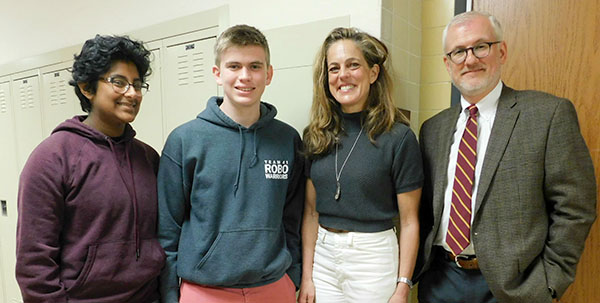One of the highlights of the first part of the 2018-2019 School Year at Watchung Hills Regional High School (WHRHS) was the opportunity for students to meet, hear from, and ask questions of novelist Hilary Reyl, author of the “school-wide read,” “Kids Like Us.”
Reyl, of New York City, spoke to students during assemblies held in the school’s South Auditorium this fall.
She also joined a group of WHRHS English teachers during the lunch period between the assemblies that day. Much like the sessions with the students, Reyl was forthcoming with her time and attention, according to English Department Supervisor James Aquavia. She shared her experiences and the unique perspectives and insights that went into both the writing of this novel and her other writings.
“For days after Hilary Reyl’s visit,” Aquavia said, “teachers dropped by to say how much they and their students appreciated the opportunity to hear her thoughts on what motivated the development of this novel – her experience, reading, research, imagination and craft – as well as her observations about the process of writing this novel, and of being a writer as a profession.”
Reyl also provided positive feedback to Aquavia about her visit to WHRHS, he said.
“My happiest moments as an author are moments of dialogue around my work,” Reyl said. “Seeing it refract differently in all kinds of minds and hearts is amazing. Interaction with readers is so nourishing and inspires my work going forward. And you have a terrific bunch of readers.”
Reyl’s appearance was made possible by Nicolle Anthony, a Community Business Development Manager with Barnes and Noble, Inc. It was she who suggested the possibility of having Reyl visit WHRHS to speak to students and teachers, Aquavia said.
Dealing With Being on the Autism Spectrum
Kids Like Us is Reyl’s second novel, published in 2017 by Farrar Straus Giroux Books for Young Readers, an imprint of Macmillan Publishing Group, New York.
Reyl started the student assemblies with a short talk about the experience of writing the novel. Then students Ian Martin of Warren Township and Shoili Banerjee of Millington were selected to start the lengthy question and answer session during the first assembly. Students in the audience at both assemblies were invited to ask additional questions, and they supplied dozens of questions.
The book was written as a diary by her protagonist, a high school-age student named Martin. The style of the writing is faithful to the perspective of being in the voice of Martin, who is on the Autism Spectrum. Reyl shared during her remarks the fact that one of her daughters is, like the character Martin, on the Autism Spectrum. She added that she included among the challenges faced by teens on the spectrum as well as how their parents have a natural tendency to want their children to maximize their potential. As a mother, she understands how parents want their teens to stretch their communication and interpersonal relationship skills. They hold the notion of wanting their teens to “become all they can become.” As author, however, she also understands the equally important sense that teens like Martin want the complex assurance from their parents that they are loved by their parents for who they are now, not only for who they wish they may become.
This dichotomy is a theme addressed throughout the novel from a variety of perspectives and in a variety of characters, both teen and older, and both on the Autism Spectrum, and by those who are not. In the book, folks not on the Autism Spectrum are referred to as “neuro-typical.”
The School-Wide Read
English Supervisor Aquavia explained the goals of the school-wide read.
“This book was assigned to all students,” Aquavia said. “The school-wide read must appeal to readers of multiple grade levels and provide a shared experience that readers can value and remember. It helps readers gain insight and, through discussion, develop community. Kids Like Us has been that for us this year, and we are delighted to have read it as a school community.”
The assemblies intentionally included students from a broad array of English classes, from English 1 classes for first-year students, right up to Senior AP Literature classes.
Other objectives of the school-wide read every year are to help the school build a stronger community environment, one marked by greater tolerance for all people at WHRHS. The thought was to not just read the book, but to have the chance to discuss it, learn from it, and possibly have a chance to speak to its author.
“We hoped that the discussions would get at some of the stereotypes students may have about anyone on the Autism Spectrum or, for that matter, anyone who may be different in any way. We hope to start to break down stereotypes, and to develop more understanding, empathy and individual respect for each other,” Aquavia said.

(above, l-r) Watchung Hills Regional High School (WHRHS) students Shioli Banerjee, of Millington and Ian Martin of Warren Township and WHRHS English Supervisor James Aquavia, right, welcomed Author Hilary Reyl to the school’s South Auditorium on Wednesday, October 17. Reyl wrote this year’s “school-wide read,” the coming of age novel, “Kids Like us,” and she spoke to students and staff, sharing her perspectives both on her book, and on writing as a profession, at two assemblies. The experience was one of the highlights of the first part of the 2018-2019 School Year at WHRHS.
Photo by WHRHS

